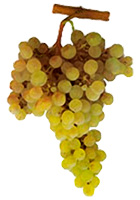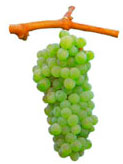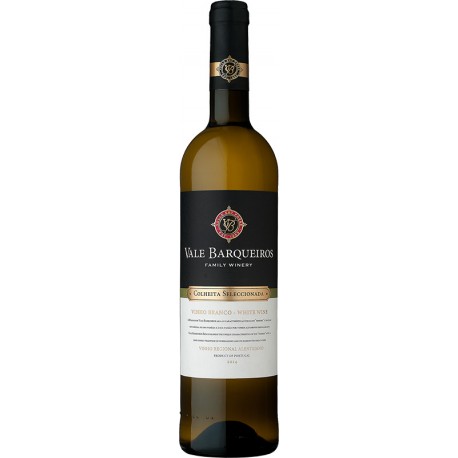White Wine Vale Barqueiros SELECT HARVEST
AL4
New product
A wonderful white wine from the Alentejo region with yellow citrine color.
In the nose we can find aromas of orange peel and pineapple.
In the palate we can savor peach notes, it is an elegant white wine with some acidity that balances and enhances the structure that presents.
Long and pleasant persistence.
Data sheet
| Export Box: | 6 bottles |
More info
White Wine from the Alentejo Selected Harvest.
It’s a premium quality white wine from the Alentejo region in Portugal.
In the first look we can check that it has one yellow citrine color. It’s a white wine with a wonderful aroma of orange peel and pineapple.
In the palate we can savor peach notes, it is an elegant white wine with some acidity that balances and enhances the structure that presents. White wine with long and pleasant persistence.
A white wine to enjoy with your meals or just for relax alone or with friends…
We recommend that you enjoy this white wine at the temperature between 8/10 °C.
Some food ideas:
Grilled red gurnard with garlic and lemon, Piri-Piri prawns (spicy prawns), Blackened chicken with green salad, Grilled tuna steak, Stuffed red peppers, Burritos with chicken and cilantro, etc.
Classification: Vinho Regional Alentejano
Type: White / Selected Harvest
- Acidity: 4,9 g/dm3
- pH: 3,29
- Sugar: 0,4 g/dm3
- ABV: 13.5% Vol.
Viticulture:
Harvest: 2015
Grapes Varieties: Arinto and Antão Vaz
Region: North Alentejo - Portugal
Soil type: Granite derived
Climate: Mediterranean
Harvest:
Date: September of 2015
Type: Manual/Hand picking
Vinification:
Fermentation: In stainless steel, at low temperature, after static decanting.
Maturation: In stainless steel with stabilization at a temperature of 6°C to 8°C during the first two weeks, followed by stage in vats.
The grapes
 ARINTO
ARINTO
Arinto is such a versatile variety that it has spread through most of Portugal, taking on quite disparate names depending on the region. These include Pedernã, Pé de Perdiz Branco (White Partridge Foot), Chapeludao, Cerceal, Azal Espanhol, Azal Galego and Branco Espanhol (Spanish White)!
It produces fresh, tense and vibrant wines with high natural acidity and marked mineral profile with good ageing potential. Unyielding acidity is Arinto's calling card, and it is precisely for that reason that it is described as being the Alentejo's best blending variety.
While Arinto is most famed in the Bucelas denominated wine region, where it is traditionally bottled as a varietal wine, in the Alentejo its grapes are used more in blends to provide that all-important acidity. It has a discreet aroma with no pretensions of exuberance or intensity, showing notes of green apple, lemon and lime accompanied by a vegetal character and mineral pungency. In specific cases it may take on a tropical character, evoking the exoticism of passion fruit.
Lengthy macerations and fermentations at low temperature put back any lustre that may have been lost. Oak fermentation also suits Arinto, although ageing potential in bottle is lost in this process.
 ANTÃO VAZ
ANTÃO VAZ
The origins of the Antão Vaz grape varieties are extremely vague; little is known of its provenance other than it originates from the Alentejo. As it has not travelled much out of the region, Antão Vaz has no other synonyms.
The variety has attained star status in Vidigueira and Évora, sub-regions that generate Antão Vaz wines of great complexity.
The variety is loved by vine growers and winemakers alike, ex libris of the Alentejo and heart and soul of its finest white wines.
Being a hot-climate grape variety, Antão Vaz is particularly well-suited to the Alentejo's sun-drenched plains and highly resistant to drought and disease. It has consistently reliable yields which ripen evenly. As a rule it produces perfumed, well-structured, firm and full-bodied wines, although in adverse conditions they may lack refreshing and reinvigorating acidity. For that reason it is often blended with Roupeiro and Arinto wines to ensure a natural, sharper acidity.
If harvested early Antão Vaz will originate vibrant, acidic wine with exotic aromas, firm on the palate. If the grapes are picked late the results will have higher alcohol content and more perfumed aromas, ideally suited for ageing in new-oak barrels.
When bottled as a varietal wine, Antão Vaz shows aromas of ripe tropical fruit, tangerine peel with discreet mineral notes.
 The Alentejo Region
The Alentejo Region
Alentejo is one of the biggest wine regions in Portugal. This hot and dry region is made up of wide plains, only interrupted by small mountains. Alentejo has benefited from numerous investments in the wine sector, which enabled the region to produce the best Portuguese wines and, therefore, gain international recognition.
Located in the south of Portugal, Alentejo is a sunny region, allowing the perfect ripening of the grapes. As temperatures are very high in the summer, the vine has to be irrigated.
There are several grape varieties in Alentejo; however, some are more relevant than others (whether because of quality or planted area). The most important red grape varieties in the region are Trincadeira, Aragonez, Castelão and Alicante Bouschet (a French variety that adapted itself to Alentejo’s climate) are also important.
White wines from Alentejo are usually soft, slightly acidic, with tropical fruit aromas.
The Vineyard
The estate consists of 122ha of vineyards, 330ha of olive trees, a forest area comprised of cork oak and stone pine and several dams to meet the irrigation requirements.
The company decided at the beginning that they would use the most advanced technologies available in the field of viticulture and also for the olive groves. A drip feed irrigation system was installed to give both the vines and the olive trees the best possible care to maximize the quality of the crop. It also has partnerships with international experts who have contributed to the development of the “know how” of the estate itself and as a result the company has become a reference for the latest technologies.
The 122 hectares of vineyards of the estate are planted in bilateral cordon system, with the predominance of Portuguese grape varieties, particularly Aragonez and Trincadeira, the two most important of the Alentejo region, as well as Touriga Nacional, Arinto, Antão Vaz and Trincadeira complemented by the internationally renowned Alicante Bouschet, Cabernet Sauvignon and Syrah.
Awards:
- Silver Medal in CWSA (China Wine & Spirits Awards) 2016
- Silver Medal in Mundus Vini 2012 in Germany
- 1st place Trophy in Nectar diVino 2011 on white wines class
- Merit Degree in National Competition for Bottled Wine 2010 in Portugal (Santarém).
- 87 points in Wine Spectator in 2010
Cheers.







